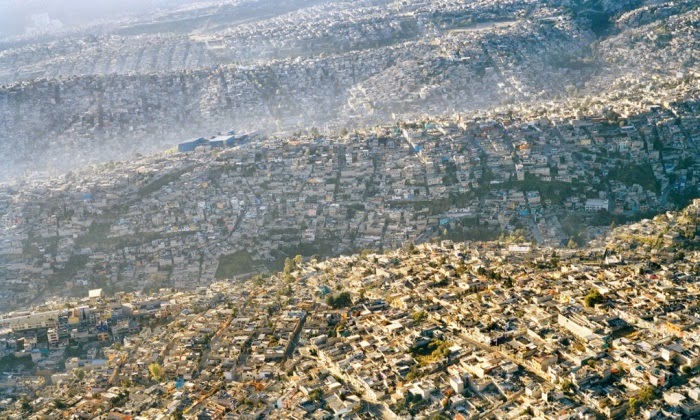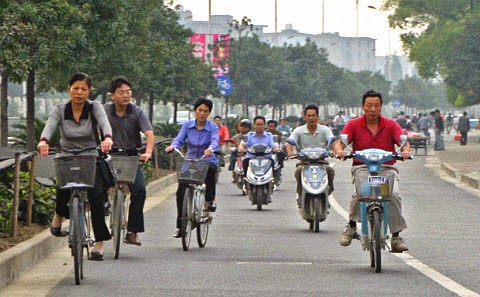 I recently returned from a one month tour of Asia - specifically Singapore, Malaysia, Hong Kong and China. With the exception of Malaysia, which outside of Kuala Lumpur is fairly sparsely populated, the trip served as a reminder of what we must accept we are moving towards in terms of density of population and how we might deal with it. I also find this concerning in the light of the recent migrant crisis, with tens of thousands of people fleeing war, poverty and political unrest for a chance of living somewhere safer with a better quality of life. And who wouldn't? Many of us living in relative comfort are here because our forefathers struck out and left somewhere far less attractive, for the sake of providing a better future for themselves and their families.
I recently returned from a one month tour of Asia - specifically Singapore, Malaysia, Hong Kong and China. With the exception of Malaysia, which outside of Kuala Lumpur is fairly sparsely populated, the trip served as a reminder of what we must accept we are moving towards in terms of density of population and how we might deal with it. I also find this concerning in the light of the recent migrant crisis, with tens of thousands of people fleeing war, poverty and political unrest for a chance of living somewhere safer with a better quality of life. And who wouldn't? Many of us living in relative comfort are here because our forefathers struck out and left somewhere far less attractive, for the sake of providing a better future for themselves and their families.
The media is on fire with reports about swarms of migrants invading our shores
in search of a better life. But this is nothing new.
World population officially passed 7 billion on 31 October 2011. According to the United Nations' World Population Prospects report,[4] the world population is currently growing by approximately 74 million people per year. Current United Nations predictions estimate that the world population will reach 9.0 billion around 2050, assuming a decrease in average fertility rate from 2.5 down to 2.0. Almost all growth will take place in the less developed regions, where today's 98.3 million population of underdeveloped countries is expected to increase to 7.8 billion in 2050. During 2005–2050, nine countries are expected to account for half of the world's projected population increase: India, Pakistan, Nigeria, Democratic Republic of the Congo, Bangladesh, Uganda, United States, Ethiopia, and China, listed according to the size of their contribution to population growth. China would be higher still in this list were it not for its One Child Policy (although this policy has been recently relaxed). More data is available on Wikipedia and other sites such as the UN, but the above statistics alone make startling reading, do they not?
Urban sprawl. Mexico City goes on and on. See Guardian pics on Overpopulated Planet.
What This Means To You And Me
Statistic tend to baffle. It sounds a lot but what does it mean in real terms? The naturalist and campaigner David Attenborough is a great campaigner for increased awareness and individual responsibility over human population growth. He campaigns via the organisation Population Matters and much detail can be found on their website about the likely practical realities of the issue. Population Matters are rather good at putting things into terms we can understand. People have differing opinions about what it all means to us but one thing is clear, people will not be able to continue living on this planet as we currently do. It has been said that by 2050, the only way the world will be able to support the predicted number of human beings is if we all live the way most Indians now do. This means a meagre vegetarian diet, travel by bicycle, very few cars, minimal overseas travel and only having a very small space within which to live. This extreme change in quality of life will shock most westerners. Of course if we do not manage to keep on top of the battle against drug-resistant viruses, then the population figures might be very different. But who would wish for that? It may well be us westerners with our sanitised lives that die-off first.
Hong Kong suburb of Tai Long Wan. Some think it ugly, but it works.
There are parks & trees and under each group of buildings is a kindergarten,
supermarket, laundry, cafes, tennis/basketball courts etc.
The AlternativesIf we look at China, with a current population of around 1.4b, we can see that ruthlessly restricting the birthrate via a one child policy does work. It will be interesting to see how people in western democracies respond to being told how many children they are allowed. Freedom of speech pales into insignificance by comparison. Asian cultures seem to more easily accept the concept of doing things for the good of their country or culture. Singapore is a prime example of where a vibrant capitalism in terms of monetary and trade policy has been easily accepted alongside rigid social policies involving restrictions (tax penalties etc) on the number of children you can have, on car use and in housing people in numerous collections of high-rise blocks. Hong Kong and Chinese cities have done the same. Huge new-towns of identical skyscraper apartments are increasingly prevalent. Elderly people grumble but most accept it as necessary and focus on the benefits. But how easily would we in the west adapt to such measures? Well the truth is we are unlikely to have the choice. Short term we could move to less populated wilderness areas but those would soon be overrun.
Not all of Singapore suburbs look like Bladerunner scenes.
Today near Jalan Kayu, an idyllic Singapore village where I was born. The local rail network links to MRT tube network.
The Model For The Future
China is embracing green energy and electric transport. There are estimated to be over 120m electric scooters in China and growing fast. Hong Kong copes well with population density. In the New Territories, not much more than half an hour out of Hong Kong Island and Kowloon, people live in quiet countryside. Commuting is a foreign concept to them. They also seem to like living close together. Like Singapore they have a myriad of new tower-block suburbs do deal with the demand to live there. But they are more chaotic than in Singapore - less happy to be told what to do. Lee Kuan Yew, the single-minded visionary who shaped the modern miracle that is Singapore, saw all of this coming and prepared for it. Looking at his country now, one can see that he probably got it exactly right. Singaporeans accepted being told what to do. Visitors marvel at the place but often criticise it for being somewhat sterile, perhaps robotic in its efficiency. As someone who was born there back in 1958 when it was markedly dirty and inefficient, I sympathise with that view. But unlike many beautiful cities elsewhere, Singapore is sustainable. Its people as well as its infrastructure are ready for a densely populated future. They will thrive while other places wither. But some things surprise me. Cycling is not a major form of transport, but then that is probably due to the heat (in Hong Kong they say it's because of the hills but I enjoyed some great cycling there). But why not legislate to demand electric vehicles only in the city centre (as in many Chinese cities now)? And with so much year-round sun why is every building not compulsorily fitted with solar panels? Perhaps they are waiting until things get really bad first? There is clearly still room for improvement. But looking at Singapore - a small island with a big population that punches well above its weight economically - I do feel I see the model for a sustainable future more than in most places. And that cheers me. With solar power and more facilities for cycling, I could put up with Singapore.
China - 120m electric scooters and rising (they cost around £200 new)
Unlike Wilson Chan, most locals have yet to realise how good cycles are
for getting around Hong Kong
By accepting high-rise living, Singaporeans can afford a proportionally large, pristine jungle in the centre.
It provides recreation, a home for indigenous wildlife, keeps people sane and cleans the air.
 In 2008/9 Mark Swain cycled from Ireland to Tokyo, a journey of 10,000 miles with his 18 year old son Sam. If you would like to read their bestselling travel book 'Long Road, Hard Lessons', you can find this, along with his two collections of short stories, on Amazon, Smashwords etc.
In 2008/9 Mark Swain cycled from Ireland to Tokyo, a journey of 10,000 miles with his 18 year old son Sam. If you would like to read their bestselling travel book 'Long Road, Hard Lessons', you can find this, along with his two collections of short stories, on Amazon, Smashwords etc.
In the UK his books can also be found in all Waterstones Bookstores.








This is fascinating stuff, Mark. Though to be honest by 2050 I'll be long gone so I don't really care. I also think that the powers that be (you know, the real ones) will have unleased another AIDS type virus before that happens, anyway.
ReplyDeleteI did a rough calculation and I worked out that you can fit everyone in the world into the area bounded by Coventry, Leicester, Northampton (where I live at the moment) and Corby, giving each person 2 square feet of standing space. Of course, they would soon spread out and strip Britain bare. But it does make me wonder how much sprawl can be turned into vertical living.
ReplyDeleteAlso, I notice that the rate of global population increase is slowing. Maybe it will reach 8-9 billion and then start decreasing. However, that creates a problem in itself. Most economies are based on continuous growth and the only way to attain that is through constantly increasing the population.
Developed countries might start begging for immigrants but they won't come because global population decline means that nobody is migrating. Eventually, a complete die-off or a very small agrarian population of humans might be the result. No species lasts long on this planet and human arrogance can't make up for that fact.
For everyone on the planet to live like Europeans we need three planet Earths and their resources. Clearly those resources do not exist. Those of a left/liberal persuasion will do or say anything to help the needy. Whilst I agree with the sentiment the only way to achieve economic parity is for Westerners to drastically decrease their standard of living whilst the rest of the world gets a meagre increase.
JayBee, Kilkenny
Totally agree with what you say here, JayBee. Land could, and will have to be, better utilised. I will take some perverse delight in seeing the consumption-adicted westerners having to move into tower-blocks and survive on a lifestyle like those in developing / agrarian countries. I do not count myself as one of these consumption gluttons despite falling into the same general demographic - neither do I labour under the misguided impression that donating money or old clothes to 3rd world nations balances out western greed. I hope I'm not alone in my desire to see our current excessive lifestyle die out and be condemned to a shameful history.
ReplyDeleteMark